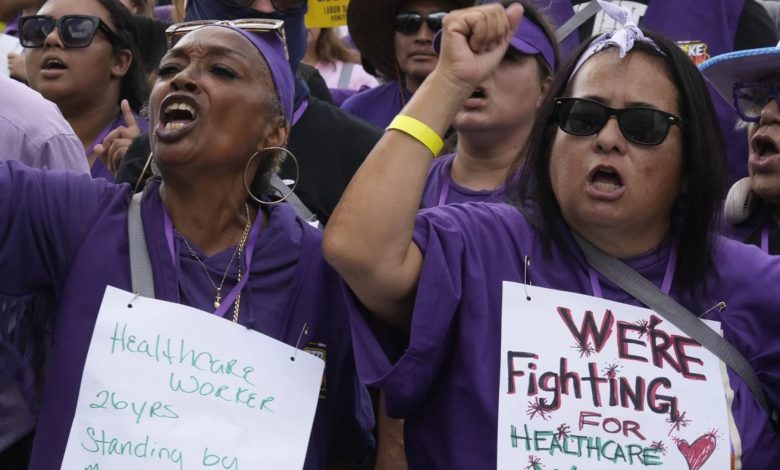Kaiser Strike: A Turning Point in U.S. Healthcare Labor

A Historical Healthcare Workers’ Standoff
In an unprecedented move, over 75,000 dedicated healthcare professionals employed by Kaiser Permanente in California, Oregon, Washington, Colorado, Virginia, and Washington, D.C., embarked on a strike of monumental proportions. This monumental event marks the largest healthcare worker strike in the annals of American history.
The root cause of this extensive strike is an impassable chasm that has persisted for months in contract negotiations between Kaiser Permanente and the Coalition of Kaiser Permanente Unions (CKPU), the representative body for these dedicated workers.
Unwavering Demands for Change
The CKPU, echoing the sentiments of its members, has put forth a set of resolute demands, emphasizing better compensation, augmented staffing levels, and an overhaul of working conditions. The union alleges that Kaiser Permanente has consistently rebuffed their pleas, prioritizing profits over the well-being of their patients.
Kaiser Permanente: A Healthcare Giant in Crisis
Kaiser Permanente, a non-profit healthcare juggernaut, attends to the medical needs of a staggering 13 million individuals across eight states. The organization asserts its commitment to brokering an equitable agreement with its workforce and underscores its preparedness with contingency measures to ensure that patients receive uninterrupted care during this upheaval.
Patient Care Impacted
The effects of the strike are already cascading on patients seeking medical attention. Some Kaiser facilities have been compelled to reduce their services, resulting in prolonged wait times for appointments and procedures. Kaiser Permanente has urged patients to exercise caution and confirm the status of their appointments before venturing to their medical facilities.
Union Vows to Minimize Disruption
The CKPU, standing unwaveringly in their commitment to their cause, has pledged to mitigate the repercussions of the strike on patients. Moreover, the union has expressed its readiness to engage in round-the-clock negotiations with Kaiser Permanente to arrive at an amicable settlement.
A Groundswell of Support
The labor community, patient advocacy organizations, and elected officials have rallied behind the CKPU in an impressive display of solidarity. Nationwide, rallies and protests have been organized to shed light on the strike’s gravity and the underlying demands.
Presidential Backing
Notably, President Biden has stepped into the fray, offering his unequivocal support for the striking Kaiser workers. In a resounding statement, President Biden affirmed his alignment with the workers in their pursuit of improved wages, safer working conditions, and high-quality healthcare for their patients.
The Path Forward
The strike is slated to persist until Kaiser Permanente and the CKPU find common ground. Although the two parties are scheduled for another round of negotiations on Thursday, the prospect of a breakthrough remains uncertain.
Should the strike endure, its impact on patients and the healthcare system at large in the affected states is bound to be substantial. Kaiser Permanente ranks among the most prominent healthcare providers in the United States, and its ongoing labor dispute has already thrown medical care for millions into disarray.
A Landscape Altered
The Kaiser strike is an ominous sign of the mounting discontent among healthcare workers in the United States. Experiencing burgeoning workloads, dwindling wages, and a scarcity of personnel, these professionals have been pushed to their limits. The COVID-19 pandemic has only exacerbated these issues, leaving many healthcare workers feeling overworked and undervalued.
A Test of Commitment
This labor strike serves as a litmus test for the Biden administration. President Biden has made clear his intention to support unions and enhance working conditions for American laborers. The manner in which the administration handles the Kaiser strike will undoubtedly convey the extent of its dedication to these commitments.
In Summation
The Kaiser Permanente strike is a watershed moment in the U.S. healthcare landscape. Its repercussions on patients and the healthcare system within the affected states are profound. This conflict serves as an emblematic manifestation of the growing unrest among American healthcare workers.
The outcome of this standoff remains shrouded in uncertainty. Nevertheless, its ongoing impact is unmistakable, and it is poised to leave an enduring imprint on the American healthcare system for years to come.




